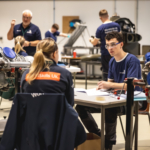You may not be aware that the UK hospitality industry – made up of thousands of hotels, restaurants, cafes and pubs dotted across the country – is a major player in economic terms. According to ONS figures, the total turnover of all businesses in the hospitality industry reached £98bn in 2017 and all expectations point to the £100bn mark being comfortably breached when this year’s figures are published. The industry is the fourth largest employer in the UK, accounting for 3.2m jobs across England, Scotland, Wales and Northern Ireland. With such enviable growth and strong employment, the sector has a lot to be optimistic about.
However, from my conversations at WorldSkills UK LIVE earlier this month with key businesses such as Greene King and Marston’s, it was clear that the twin challenges of Brexit and high rates of employment across the economy mean that the industry needs to gear up if it is to successfully insulate itself against the new labour market challenges of the years ahead. As Katie Nicholls, the CEO of UK Hospitality has recently pointed out, businesses are currently in the mindset that they have to recruit from outside the UK to complement their home-grown labour. With Brexit on the horizon and the number of non-UK workers already falling, there is a real concern that ‘if the talent pool continues to shrink, then businesses will be unable to invest and grow’. Current uncertainty around the final Brexit destination is particularly acute for hotels and restaurants since up to around a quarter of employees working here are from the EU. Whilst we don’t know the exact parameters of future UK access to the EU labour market, all the signals are that the focus is going to be on home-grown talent to fill new vacancies in the years ahead.
So that will mean more British workers in cafes and hotels across the country when we are receiving our cups of coffee or checking in for a weekend break. On the one hand, there is an enormous opportunity here to excite our young people about the potential such jobs offer; on the other, as a recent survey by KPMG has set out, the scale of the challenge of realising this opportunity means we’d better have serious and detailed plans in place soon. According to the report, the hospitality sector faces a recruitment shortfall of upwards of 60,000 workers each year from next year. By 2029, the hospitality sector could face a total recruitment gap of over 1 million workers due to lack of access to EU workers unless it is able to replace these workers with British employees. Doing so is easier said than done. As the report makes clear, there is currently a ‘perception gap’ with respect to British workers’ views on the hospitality industry. This is rooted in concerns about levels of pay, seasonal working patterns and the long-term viability of these careers. Worryingly it is a trend with traction amongst young people too: a survey earlier this year found that less than a quarter of young people would consider a job in the sector.
I think if young people could actually see what these careers meant in practice, we could go a long way to changing minds and recruiting the next generation of home-grown high flyers into the industry. Some of the most exciting competitions in the WorldSkills UK portfolio are hospitality-based: I’m thinking of skills like restaurant service, cooking, patisserie and confectionery. When you see these skills in action, like they were at LIVE earlier this month, you get a new understanding of what it takes to succeed in them and the hidden depths that are required to be a winner. As the experience of our EuroSkills Budapest restaurant service competitor, Wales’s Collette Gorvett shows, if you are really good at what you do, there is no limit to what you can achieve. In Collette’s case, this took her from working in a burger bar in Swansea to London’s Ritz hotel. Similarly, some of our recent cooking competitors such as Danny Hoang and Ruth Hansom have gone from chef to chief by starting their own businesses as a result of world-class performances on the international skills stage. Given our historic dependence on EU labour in the industry, we don’t currently have enough role models to make the next generation think that there is a viable career path to follow.
The scale of the demand for labour in the years ahead is likely to be so high that we need to step up. At LIVE in 2019, I would like to see the hospitality industry represented in a way in which it never has been before. For me this means two things: more young people training in hospitality in our skills competitions and more businesses from across the country engaging with the thousands of young people who visit LIVE and are eager to learn more about their future careers opportunities. WorldSkills UK needs to do more to bring to life the realities of working in a hotel or a pub, restaurant or kitchen – in roles in front of house and behind the scenes – making the pitch about why these careers are exactly the well-paid, stable, long-term routes to fulfilling employment that young people seek. We have some amazing brands in the UK across the hospitality sector and we want to help shout about them at LIVE!
As well as boosting the supply of home-grown role models, WorldSkills UK wants to work with businesses in the sector to get a firm handle on some of the underlying issues it faces with a view to developing more practical actions. This year, we have convened a series of roundtables bringing together partners from the worlds of engineering, construction and tech to help address some of their specific challenges. Given the immediate labour market picture, it seems that there is no time to waste for the hospitality industry. We need to take action together to keep this industry where it belongs: as one of the strongest sources of future UK economic growth.


